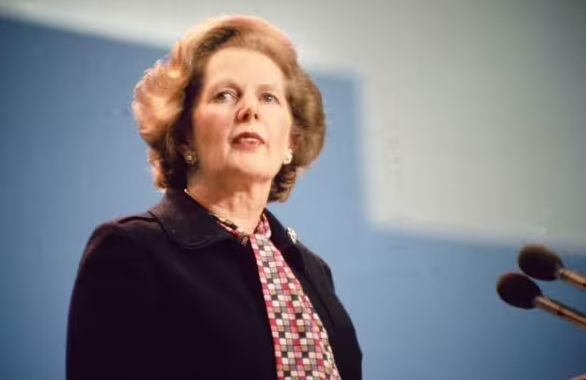Our first female PM is urgently due a reappraisal, argues her latest biographer, especially among young Britons whose views have been skewed by Leftism

Margaret Thatcher addressing the 1984 Tory Party conference (Image: Getty)
It’s amazing to think that you have to be at least 56 years old to have actually voted for (or against) Margaret Thatcher. No one under the age of 35 was even alive when she was prime minister. And yet of all our post-Second World War premiers, her legacy reigns supreme and dominates many aspects of our society and politics today. For good or ill.
Sadly, today’s youngsters are growing up being led to believe that anything wrong with Britain today is down to her and the changes she wrought over 11 memorable years in power between 1979 and 1990. You wouldn’t think there have been eight prime ministers since then, given most of them seem to escape the scrutiny her memory still has to endure.
Two years ago I had to have physio after breaking my hip, so I got myself a personal trainer in Tunbridge Wells. At the time Aaron, my instructor in question, was 25. When I told him what I did for aliving, one of the first questions he asked was: “So, Margaret Thatcher. I’ve heard of her, but what did she do?” Given she was our first woman prime minister and the most famous since Winston Churchill, I was slightly taken aback. But Aaron is, I think, typical of a younger generation who are taught little about our country’s modern history and the personalities who have shaped who we are as a nation.
And if they are taught about her, it’s by a combination of left-wing parents and teachers who judge her as the devil incarnate, failing to recognise any of her achievements. People like an Italian friend of mine, Alessio, who is a keen young historian, but also, like many of his generation, are quite prepared to believe many of the myths that have grown up surrounding Mrs Thatcher’s beliefs and motivations.

Riding in the turret of a Centurion tank in West Germany in 1985 (Image: Popperfoto via Getty)
I decided to do something about it, and write a new, short biography of Margaret Thatcher this year, the centenary of her birth, aimed at younger generations who don’t want to read 800 pages, but are happy to read anintroductory primer. The biggest challenge was to reduce her life, successes and failures down to 170 pages. Believe me it wasn’t easy. The longer a world statesman has been dead, and Mrs Thatcher died in 2013, the greater their mythology becomes.
As time goes on, fewer people who worked with them survive to correct the myths. Mrs Thatcher is both a victim and a beneficiary of this phenomenon. She was a woman oftremendous paradoxes. Yes, she was in many ways a conviction politician – the total opposite of Sir Keir Starmer who seems to believe in nothing.
She had a basic set of core beliefs and morals, and rarely strayed from them. Once she determined a course of action, it was difficult to persuade her away from it. Yet she was also a pragmatist, someone who was willing to be persuaded by the force of argument. She delighted in her reputation as an ‘Iron Lady’, the epithet given to her by a Soviet newspaper in 1977.
Yet she could also be emotional, and even tearful, when confronted by personal or national tragedy. She could be brutal in some of her dealings with her male ministerial colleagues, yet legion are the stories of her personal kindnesses to them and their families, as well as to her Downing Street staff. Her reputation as a cabinet leader was one of being quasi-dictatorial, yet she left her ministers to get on with their jobs, far more than any of her successors ever have.
She liked to win an argument, but relished having one. Many was the junior minister who emerged from an argument with her imagining he had ruined his chances of promotion, only to find a few months later that he had been elevated.

With US President Ronald Reagan and his dog, Lucky, at White House in 1985 (Image: Bettmann Archive via Getty)
She was just as much of an enigma inforeign policy and there are equally as many misunderstandings about her motives. Many still believe she was a supporter of apartheid in South Africa, yet the facts offer a different version of history. She played a big, but unsung role in bringing apartheid to an end, as evidenced by the British ambassador, Robin Renwick, and the fact that Nelson Mandela thanked her for it.
The myth also grew that the Falklands War and the so-called “Falklands factor” was the main reason she won the 1983 general election. The fact is that by April 1982 the economy was starting to turn round and so were the opinion polls. Even 35 years after she left office, her legacy is still cited as being at the root of many a modern-day British failure.
There is an element of truth in the belief that she still dominates British politics and the economic settlement. She regarded Tony Blair as her proudest achievement and with good reason. He went down plenty of policy roads which would have caused a degree of queasiness in her later life, but Blair never questioned the basis of the Thatchereconomic and industrial settlement.
Nor has any government since. Nor do Sir Keir and Rachel Reeves. In this way, 1979 can be seen as a real political and economic turning point for Britain. Successive Conservative and Labour administrations seemed to believe that the job of government was to manage Britain’s economic and international decline.
Margaret Thatcher was having none of that. By the time she came to power she had had the best part of five years to prepare for it. She knew that establishment forces in the political, economic and media worlds would be set against her. She knew a large part of her own party would oppose her. She knew she would have to crack a few heads together and court unpopularity, particularly in the early years.

With her former press secretary, Sir Bernard Ingham (Image: PA)

Margaret Thatcher at work whilst a research chemist in 1950 (Image: Corbis via Getty)

Lady Thatcher’s state funeral in April 2013 (Image: Getty)
There would be huge pressures on her, not least from the majority of her cabinet, to execute economic U-turns when the going got tough. “You turn if you want to. The lady’s not for turning,” she memorably told her 1980 party conference.
Any prime minister whose premiership spans three decades is going to make mistakes and errors of judgement. Mrs Thatcher was no exception. The introduction of the Community Charge, which became known as the Poll Tax, was chief among them, and directly led to her downfall.
Not allowing local councils to reinvest the financial gains from the sale of council houses in new housing stock was another one, which has partly led to the problems the country is experiencing today with lack of supply. The introduction of Section 28 of the Local Government Act in 1988, which sought to ban the promotion of homosexuality in schools, was a catastrophic misjudgement which still blights the Conservative Party’s record on social reform to this day.
The fact that Mrs Thatcher was one of only a handful of Conservative MPs to have voted for the decriminalisation of homosexuality in 1967 is completely ignored or forgotten.
The Labour politician Tony Benn always divided politicians into weathervanes or signposts. Like Clement Attlee, Mrs Thatcher undoubtedly fell into the latter category. Opinion remains divided as to which of these post-war prime ministers is the greatest. Poll after poll of university lecturers and professors puts Attlee in first place, but 85% of academics self-identify as being on the left.
What is certain is that they both knew their own minds; they knew what they wanted to achieve, if not always how best to achieve it. They both had major foreign and military achievements to their names, but in personality could not have been more different.
She ushered in a period of 30 years of consensus on the limited role of the state, an industrial relations settlement and the dominance of the private sector in the economy. Only now is this settlement being seriously questioned. The Thatcher doctrine was of its time but many of the lessons can be applied to the politics of today. Kemi Badenoch, take note.
- Margaret Thatcher by Iain Dale (Swift Press, £16.99) is published June 5

Iain Dale’s new mini-biography of Margaret Thatcher (Image: Swift Press)


Most Popular Comments
1st Most liked comment • 14 hours ago14
“Her policies are directly responsible for the mess we are in now!! 1. Lack of housing, because she sold off council houses without allowing LA’s …”
2nd Most liked comment • 14 hours ago13
“Thatcher was a conviction politician, she firmly believed people no matter where you …”
3rd Most liked comment • 11 hours ago13
“Thatcher saved this country from trade union strangulation and gave people the chance …”